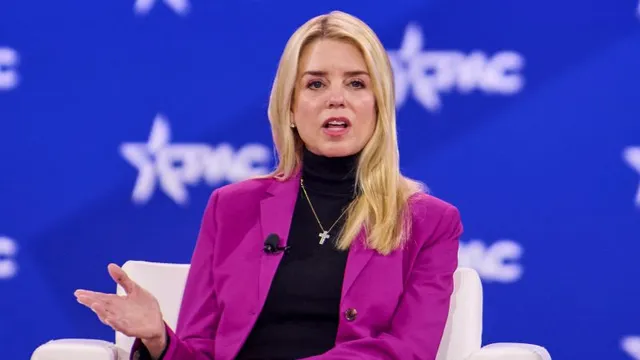
Diane Seltzer wins D.C. Bar presidency in landslide victory
2025-06-09 18:43- Diane Seltzer was elected the new president of the D.C. Bar Association, receiving 90.9% of the votes.
- Brad Bondi faced heavy opposition due to his political ties and criticism regarding potential partisanship.
- The election reflects significant engagement among members, highlighting tensions within the American legal system.
Express your sentiment!
Insights
In a significant electoral event held recently, members of the D.C. Bar Association overwhelmingly rejected Brad Bondi, the brother of Attorney General Pam Bondi, in his bid to lead the organization. Voting concluded with attorney Diane Seltzer emerging victorious, having secured an impressive 90.9% of the total votes cast. The election witnessed high member engagement, with nearly 37,000 ballots cast, marking a record voter turnout of over 41% of eligible members. This was a substantial increase compared to the prior year's turnout of just over 8%. The election's national focus stemmed from the contentious political climate and Bondi's close ties to the Trump administration, which aroused concerns regarding the potential politicization of the nonpartisan bar association. Critics worried that his victory might lead to the organization's transformation into a tool for the administration's retribution against dissenters within the legal community. Panel discussions and forums leading up to the election acknowledged the fears among legal professionals about practicing law under current political pressures, especially in light of retaliatory actions by the Justice Department against certain prosecutors and law firms. Bondi, a prominent attorney at Paul Hastings and previously involved with the Trump Media & Technology Group, aimed to maintain the nonpartisan nature of the bar while advocating for initiatives like free training for lawyers and enhanced pro bono work. His campaign, however, became marred by partisan attacks and concerns over divisive politics. Bondi expressed disappointment over how the campaign evolved into a battleground for identity politics and partisan divisions rather than focusing on the organizational goals. In contrast, Seltzer's election campaign was rooted in the principles of upholding the rule of law and providing a safe environment for attorneys to operate without fear of political retribution. She explicitly stated her priorities during candidate forums, emphasizing the need to protect the values of legal autonomy and client advocacy in the face of growing political interference. Her election stands as a pivotal moment for the D.C. Bar, as her administration is expected to reflect these values and navigate the complexities of the current legal landscape shaped by political dynamics.
Contexts
Political ties can significantly impact legal associations in various contexts. Understanding these dynamics is crucial for assessing how power relationships influence legal frameworks, particularly in terms of regulatory practices and judicial outcomes. Political affiliations may affect the prioritization of certain legal cases, influence legislative measures, and shape regulatory environments in ways that favor political allies. This interplay between politics and law underscores the importance of scrutinizing the motives behind legal reforms and the potential for conflicts of interest when political figures are closely aligned with legal practitioners or institutions. In many jurisdictions, political connections can dictate the allocation of resources to legal initiatives, thus affecting the effectiveness of legal associations in advocating for change. For instance, if a legal association has strong ties with political leaders, it may receive preferential treatment when it comes to public funding or support for specific legal programs. Civil rights organizations or regulatory bodies may face obstacles if they lack such political backing, leading to disparities in their ability to advocate for their causes. Furthermore, legal professionals with political alignments may experience career advancements or opportunities based on their connections rather than their qualifications or the merits of their cases. The reciprocity inherent in political ties also raises ethical questions concerning accountability and transparency within legal associations. When legal practitioners are aligned with political interests, there may be risks of corruption or unethical practices that undermine the fundamental principles of law. A holistic assessment of such ties could reveal patterns of favor and influence that compromise the integrity of legal processes, eroding public trust in legal institutions. As a result, it is essential for legal associations to maintain independence from political entities, ensuring that their advocacy remains unbiased and solely focused on the pursuit of justice. Moving forward, it is imperative for legal associations to actively engage in efforts to delineate the boundaries between politics and legal practice. Strengthening ethical guidelines and fostering a culture of accountability within legal professions can help mitigate the adverse effects of political ties. Ultimately, fostering the integrity of legal associations not only safeguards the rule of law but also promotes fairness and justice in society. As we continue to examine the impact of political ties on legal associations, it will be crucial to explore mechanisms for enhancing oversight and encouraging a distance between political affiliations and legal advocacy.